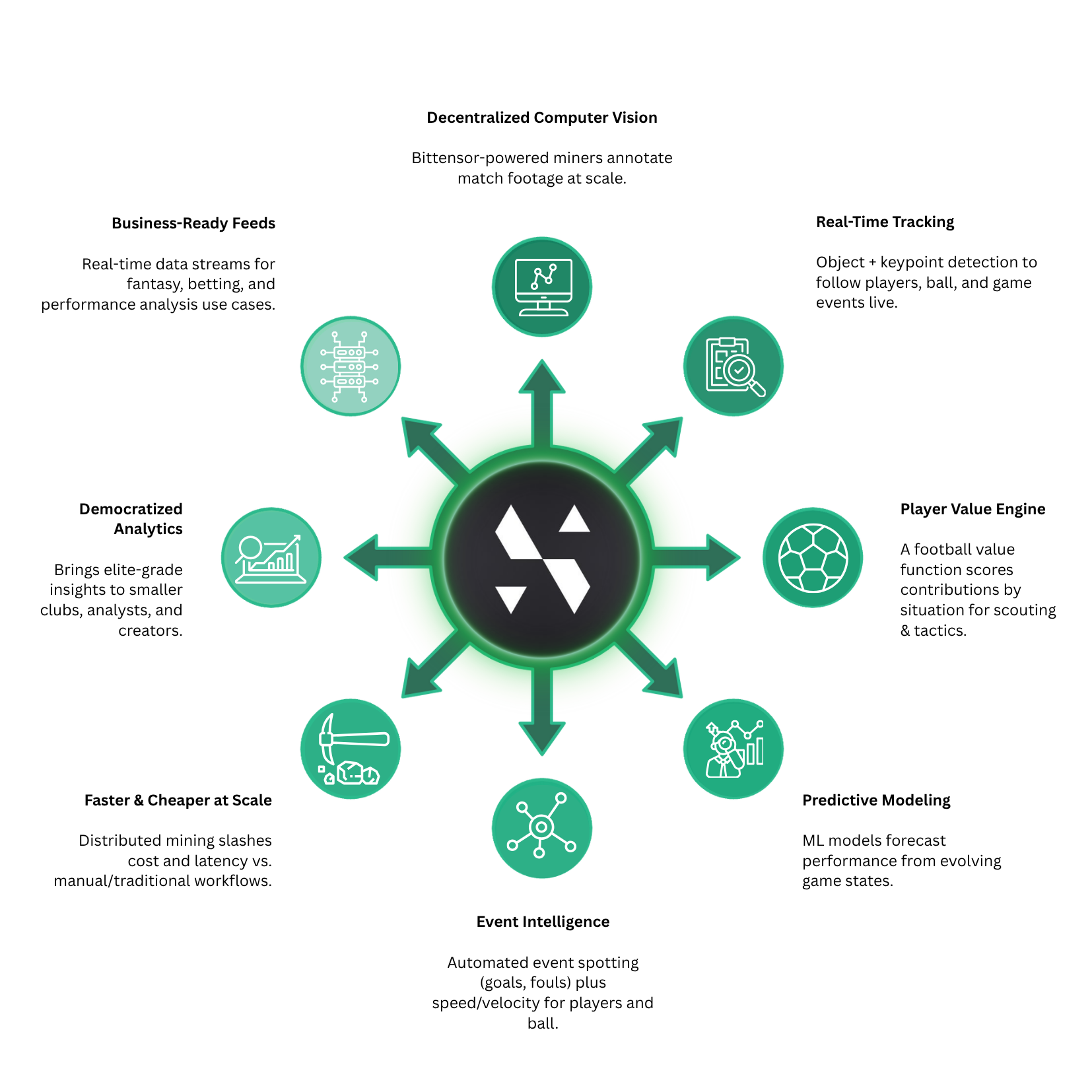This system processes football match footage to identify player movements, ball positions, and key events within the game. Using miners across the Bittensor network, Score annotates the footage, performing tasks such as object detection (for identifying players and the ball) and keypoint detection (for tracking player positions on the pitch).
Once annotated, Score provides insights about a player’s value within each game situation through a football value function. The system uses machine learning models to predict a player’s performance based on real-time game states, helping clubs and managers make more informed decisions regarding player evaluation, game strategies, and team management.
What differentiates Score is its ability to scale its operations, being able to process video data much faster and cheaper than traditional methods, with the added benefit of decentralized mining power. The technology has allowed Score to gather data far quicker than manual or traditional methods—providing real-time analytics and enhancing the accuracy of predictions related to football matches.
Additionally, Score is integrating more complex data processing, like predicting player actions, event spotting (such as goals or fouls), and even tracking the velocity of players or the ball during matches. This enables coaches and managers to get actionable insights almost immediately after a game, creating opportunities for strategic decisions during the match itself or in post-match analysis.
Currently, the validators handle challenges for top global football leagues, including:
- Premier League
- Ligue 1
- Bundesliga
- Serie A
- Championship
- Primeira Liga
- Primera Division
- Campeonato Brasileiro Série A
- Eredivisie
The base miner model, trained on these leagues, makes predictions.
Score App
This app functions as a miner by gathering predictions from fans based on intuition rather than machine learning. Users can sign up, make predictions for upcoming games, and earn TAO rewards through a points program with weekly giveaways of vouchers and tech.
Leaderboard
A leaderboard ranks participants, including users of the Score app, showcasing weekly performance.
Key Points:
- Validators fetch games starting in the next 60 minutes.
- Challenges are allocated based on validator stakes and a hash of the epoch and miner_uids.
- Miners have 12 seconds to respond.
- Matches from the previous day are checked against submissions for scoring and weight setting.
Mining
Miners generate predictions for upcoming football matches using a base model, which is a Random Forest classifier trained on historical match data. Currently, miners predict the match outcome as either a win or a draw. In the future, predictions will expand to include additional in-game events, such as final scores, half-time scores, red and yellow cards, corners, and which player scores the first goal.
Current Base Model
The base miner model is a Random Forest classifier trained on historical football match data. It:
- Utilizes features like team performance stats, head-to-head records, league standings, and match timing.
- Applies data preprocessing techniques such as imputation and feature scaling.
- Predicts match outcomes (home win, away win, or draw) based on these features.
While this model provides a solid foundation, we are enhancing it further. We anticipate that many miners will use their own optimized models for improved accuracy.
Validating
Validators create challenges for miners by providing upcoming match data and then scoring the predictions. They retrieve match information from the Score API to generate challenges and compare results against miners’ predictions to allocate rewards.
Scoring
Their enhanced scoring system now includes a streak multiplier to reward consistent performance:
Base Scoring:
- 3 points for each correct prediction.
- 0 points for incorrect predictions.
Streak Multiplier:
- The system tracks streaks of correct predictions.
- Multipliers are applied based on streak length:
- 2-4 correct predictions: 1.1x multiplier
- 5-9 correct predictions: 1.4x multiplier
- 10-19 correct predictions: 1.8x multiplier
- 20+ correct predictions: 2.0x multiplier
Final Score Calculation:
- Final Score = Base Score * Streak Multiplier
This system promotes consistent accuracy and will evolve with the addition of more in-game prediction types.


